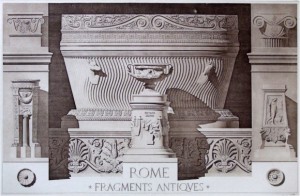 How it all began. Primitivism and the legitimacy of architecture in the 18th and 19th centuries, session at the 2014 European Architectural History Network (EAHN), Turin, 19-21 June 2014.
How it all began. Primitivism and the legitimacy of architecture in the 18th and 19th centuries, session at the 2014 European Architectural History Network (EAHN), Turin, 19-21 June 2014.
By the turn of the eighteenth century, architects and writers questioned many of the foundations of renaissance design theory and its later developments: the role of Roman antiquity as the primary provider of architectural references ; the authority of Vitruvius’ De architectura and its many editions, translations and re-workings; and also some of the very concepts that shaped this design theory, such as the idea that architecture emerged as the imitation of primitive forms of building. Challenging these authorities was not merely a matter of rejecting or reinterpreting the design principles espoused by Vitruvius or retrieved from ancient monuments. It also entailed redefining the foundations of architecture as a culturally and socially embedded artistic discipline. After all, traditional models – and primitive origins in particular – explained how architecture was enmeshed with the very fabric of society. If these authorities were challenged, new arguments had to be found explaining how architecture found its place at the centre of human culture.
In this session, we will examine one particular strain of arguments that addressed this problem : new ideas about the origins of architecture. In particular, we are interested in how the increasingly vivid debates about primitivism – the idea that any human action, institution or custom is at its purest at the moment of inception – informed new ways of thinking about architecture, its origins, and its role in society and culture. Hitherto primitivism has been considered mainly in relation to Modernism, but it emerged in the early eighteenth century as a mode of thought about the origins, meaning and legitimacy of society and cultural practices. As such, it offers a unique perspective on the still current problem of how to endow architectural forms with cultural meaning. By advocating a return to first origins, primitivism offers an alternative to history as the storehouse of architectural form and meaning.
We invite papers that address the role of the quest for origins in general, and ideas on primitivism in particular, in architectural
thought and practice in the eighteenth and nineteenth century. We welcome case studies about texts, buildings or oeuvres that open up wider intellectual, social and institutional contexts. We are particularly interested in how questions about origins and primitivism introduced new ideas into architectural discourse – such as the religious and symbolical, rather than the practical and tectonic origins of architecture – and configured the relation of architecture with other artistic and scientific disciplines, such as archaeology and different kinds of historiography, natural history, linguistics and ethnology. Finally, we are curious to see how the preoccupation with primitivism translated into building practice.
Please submit your proposal through the conference website (http://www.eahn2014.polito.
session chairs: Maarten Delbeke (maarten.delbeke@ugent.be); Sigrid de Jong (S.D.de.Jong@hum.leidenuniv.nl

Leave a Reply
You must be logged in to post a comment.